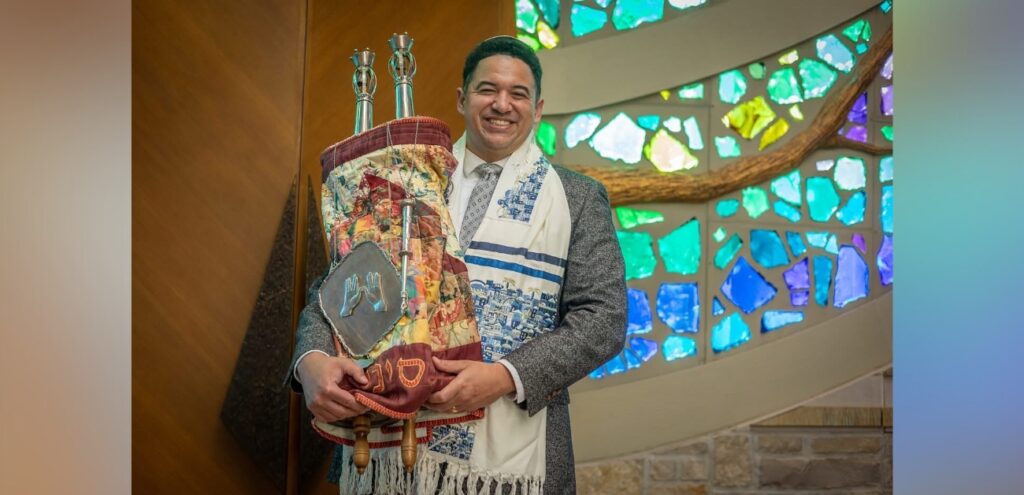When James Wiley stepped up to the bimah for his adult bar mitzvah, he sent a clear message to his children: belonging is yours, if you choose to embrace it.
“I wanted to relay to my kids that belonging is for you, and it’s something that you can have faith in…The land of milk and honey can be for you if you work for it.”
Wiley’s decision to have a bar mitzvah was a deeply personal step toward anchoring both his and his family’s identity in Jewish life. As a father, Wiley wanted his children to see that Judaism is something he lives and values – and it’s a part of who they are, too.
The story behind Wiley’s bar mitzvah decision was twofold. First, his long-standing interest in languages drew him to learning Hebrew: “I saw that it was being offered through our congregation and wanted to check it out, with no expectation that it would lead to a bar mitzvah,” he said. Second, Wiley specifically chose Hebrew to better connect with his wife, children and Jewish community. “Particularly after Oct. 7, I felt attacked, just like the rest of us did, and I wanted to find a way to actualize and express my sense of belonging in the Jewish community,” he said.
Wiley’s upbringing also played a role. Though raised Unitarian, Wiley always felt Jewish due to his matrilineal heritage. Wiley’s mother brought him to Unitarian Church, while his Southern Baptist-raised father stayed home. Now, as a father of three young children, he “wanted something different” for them and to show them Judaism mattered.
With a 7-year-old in Hebrew school, a 4-year-old starting soon, and a 2-year-old daughter, all of whom have attended Jewish preschool, Wiley said his children gave him “the impetus” to go from Hebrew class to a full bar mitzvah.
Wiley spent a year in weekly group sessions of a dozen-plus adults at Congregation Shalom, learning Hebrew, prayers, and Torah portions for their b’nei mitzvah ceremonies. “There were enough of us that we had to split into two sections,” he noted. Wiley’s spouse, Abby, watched their children throughout Wiley’s Hebrew classes.
Wiley credited much of his cohort’s journey to their teacher and fellow congregant, Rick Paler. “He’s a special person,” Wiley said.
Wiley celebrated his bar mitzvah ceremony on June 21, along with other members of his adult b’nei mitzvah group, including Jaclyn Skalecki Orozco (see page xx).
In his d’var Torah, Wiley reflected on Parashat Sh’lach. He linked the Israelites’ crisis of faith – which led God to ban them from the Promised Land – to the idea that true belonging requires faith, especially in times of doubt. For Wiley, belonging is built through service and community, like becoming a bar mitzvah and founding a Jewish father’s group, to show his children that belonging is possible with effort.
Wiley recalled a powerful moment after his speech, when the rabbi came to the bima and echoed the theme of belonging that he had discussed in his d’var Torah. “That further cemented my confidence in saying, ‘I’m Jewish,’” he said.
Wiley’s parents flew in from Philadelphia for the ceremony, a meaningful gesture – especially from his father, who had questioned Wiley’s connection to Judaism as a Black man in the Jewish community. “Having my dad be there being proud of me made me feel proud to be a Jew.”
Wiley is unsure of his next step in his Jewish journey but hopes to continue studying Hebrew. He values Judaism’s focus on life’s sacredness and the idea of tikkun olam. “Let’s make the best of the life that we have,” he said, “because this is it. That’s what we got.”



